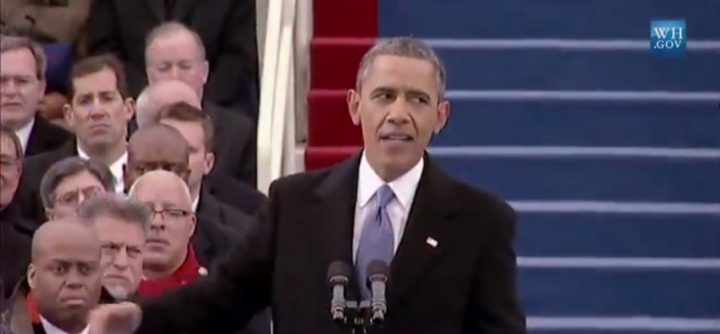
President Obama’s White House website recently unveiled a one-and-a-half-minute video, “Addressing the threat of Climate Change,” (see video below) in which he underscores his commitment to enact energy policies that he says will help stem the damage to the planet that, supposedly, is being caused by man-made emissions of carbon dioxide and other greenhouse gases (GHGs).
A big problem for the president and others in the global warming choir is that even many of the most faithful voices in that choir are dropping out and starting to sing another tune. The British journal The Economist, one of the most revered opinion bellwethers of the chattering classes, has for years been a leading purveyor of the Al Gore-IPCC end-of-the-world fright peddling, when it comes to global warming. However, in a major about-face on June 20, “Climate change: A cooling consensus,” The Economist takes writers at the New Republic and the Washington Post to task for admitting that the global warming projections predicted by the computer models have failed, while at the same time trying to spin the results in such as way as to maintain the urgency for enacting drastic (and very costly) climate policies.
“… the public has been systematically deceived.” — The Economist
The Economist criticizes Nate Cohn at The New Republic and Brad Plumer at the Washington Post for clinging to support for policies that promise plenty of pain while offering no gain, especially since they acknowledge that time and reality have proven the predicted warming scenarios to have been false. The Economist piece notes:
Mr Cohn does his best to affirm that the urgent necessity of acting to retard warming has not abated, as does Brad Plumer of the Washington Post, as does this newspaper. But there’s no way around the fact that this reprieve for the planet is bad news for proponents of policies, such as carbon taxes and emissions treaties, meant to slow warming by moderating the release of greenhouse gases. The reality is that the already meager prospects of these policies, in America at least, will be devastated if temperatures do fall outside the lower bound of the projections that environmentalists have used to create a panicked sense of emergency. Whether or not dramatic climate-policy interventions remain advisable, they will become harder, if not impossible, to sell to the public, which will feel, not unreasonably, that the scientific and media establishment has cried wolf.
Of course, the media and its selected “scientific” voices have indeed been crying wolf. And, The Economist points out, the supposed “scientific consensus” that has been touted as dogma for the past decade-plus has been shown to be a hollow and systematically deceptive façade:
As a rule, climate scientists were previously very confident that the planet would be warmer than it is by now, and no one knows for sure why it isn’t. This isn’t a crisis for climate science. This is just the way science goes. But it is a crisis for climate-policy advocates who based their arguments on the authority of scientific consensus. Mr Cohn eventually gets around to admitting that “In the end, the so-called scientific consensus on global warming doesn’t look like much like consensus when scientists are struggling to explain the intricacies of the earth’s climate system, or uttering the word ‘uncertainty’ with striking regularity.”
The Economist article then drops a couple bombshells that echo charges that The New American has been making for nearly two decades concerning the global warming. The Economist states:
If this is true, then the public has been systematically deceived. As it has been presented to the public, the scientific consensus extended precisely to that which … now seems to be in question: the sensitivity of global temperature to increases in atmospheric carbon dioxide. Indeed, if the consensus had been only that greenhouse gases have some warming effect, there would have been no obvious policy implications at all. [Emphasis in original.]
The Economist sums it up:
The moralising stridency of so many arguments for cap-and-trade, carbon taxes, and global emissions treaties was founded on the idea that there is a consensus about how much warming there would be if carbon emissions continue on trend. The rather heated debates we have had about the likely economic and social damage of carbon emissions have been based on that idea that there is something like a scientific consensus about the range of warming we can expect. If that consensus is now falling apart, as it seems it may be, that is, for good or ill, a very big deal. [Emphasis in original.]
Yes, the phony “consensus” is falling apart. In fact, as we have shown repeatedly (see links below) the claim of “scientific consensus” regarding global warming has been false from the start. Now this fraud is being acknowledged by some of the very news organs and opinionators that have previously propagated the “consensus” line. And we agree, in this case, with The Economist, that this is “a very big deal.” Perhaps someone in the White House brain trust should apprise the president of this development before he channels Al Gore at Georgetown.
Photo of President Obama at top: screen-grab from the “Addressing the threat of Climate Change” video
Related articles:
Cooking Climate Consensus Data: “97% of Scientists Affirm AGW” Debunked
Global Warming “Consensus”: Cooking the Books
Climate “Consensus” Con Game: Desperate Effort Before Release of UN Report
Climate-change Computer Models Fail Again — and Again, and Again


